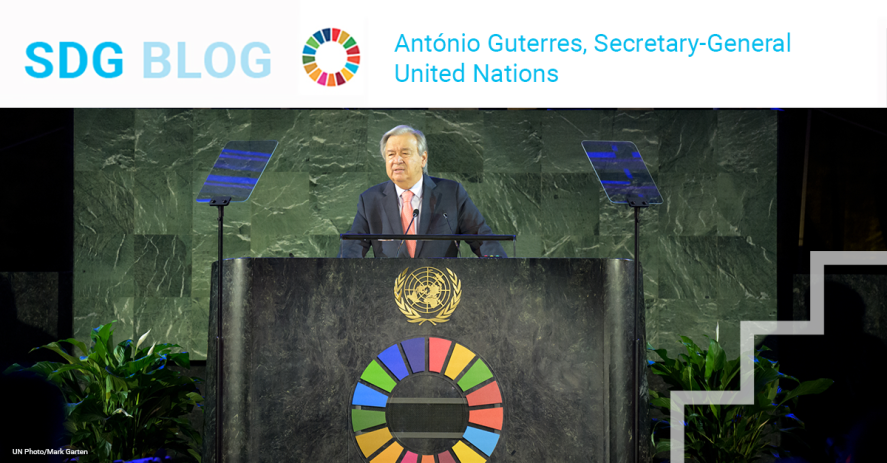If we’re in a place to rescue banks, we’re in a place to rescue the hopes of growing nations
By António Guterres, Secretary-widespread of the United Nations
The meltdown of a quantity of fundamental banks in latest months made headlines throughout the globe. better than $250 billion was mobilized by way of the course of simply one weekend to defend banks in america and Switzerland.
however there was no such rescue try for scores of growing nations struggling to handle a cascade of crises, from local climate-associated shocks to the COVID-19 pandemic and the Russian battle in Ukraine. they’re dealt with as if failure is an acceptable selection.
The pandemic and the unequal restoration hit growing nations laborious. Developed nations adopted expansionary fiscal and monetary insurance coverage policies that enabled them to pay money for restoration; they’ve now largely returned to pre-pandemic progress paths. however growing nations, confronted with extreme borrowing prices and restricted fiscal dwelling, have been unable to take movement. Turning to the monetary markets, they would possibly be charged prices of curiosity as a lot as eight occasions greater than developed nations – a debt entice.
The local climate disaster continues unabated, with a disproportionate influence on least developed nations and small island growing States. whereas developed nations can afford to pay for adaptation and resilience, growing nations can not. in the meantime, Russia’s battle in Ukraine has amplified and accelerated a worldwide price-of-dwelling disaster, pushing tens of tens of millions extra of us into extreme poverty and hunger.
Sixty per cent of low-income nations are presently at extreme risk of or in debt misery – double the quantity in 2015. Since 2020, African nations have spent extra on debt service funds than on healthcare.
whereas every nation has its personal distinctive context, the challenges are systemic, perpetuated by a dysfunctional worldwide monetary system that focuses on brief-time period returns and delivers too little, too late.
The world is quick working out of time to rescue the 2030 Agenda and the Sustainable enchancment targets (SDGs) – our universally agreed plan for peace and prosperity on a healthful planet. The prospect of a world whereby all people can revenue from healthcare, training, first rate work, clear air and water and a healthful environment is slipping out of attain.
As inequalities between rich and poor, males and females, growing and developed nations widen, a two-monitor world of haves and have-nots holds clear and apparent risks for all people. with out pressing, bold movement, this hole will translate into not solely a catastrophic enchancment deficit in lots of nations – however an explosive notion deficit throughout the globe.
as a end result of of this i am calling on the G20 to approve an SDG Stimulus – to scale up pretty priced prolonged-time period financing for nations in want, by at the least $500 billion a 12 months.
The SDG Stimulus goals to enhance prolonged time period investments in sustainable enchancment, notably the place transformation is most pressing: renewable power, sustainable meals packages, and the digital revolution. growing nations want financing and expertise to bear these transitions with minimal social disruptions.
This requires movement in three areas.
First, we should deal with the extreme price of debt and the rising risks of debt misery. we’d like a mannequin new initiative to deal with debt discount and restructuring for all nations in hazard – from least developed nations to weak center-income nations.
Debt devices ought to incorporate disaster and pandemic clauses that halt funds in occasions of disaster. The SDG Stimulus additionally requires modern devices to commerce debt with SDG investments. we’d like a mannequin new debt structure to deal effectively with the mannequin new debt panorama.
Second, we should scale up prolonged-time period concessional financing for all nations in want.
prolonged-time period productive investments in sustainability can fight the local climate disaster, create first rate jobs, stimulate progress, and construct resilience.
Multilateral enchancment banks should play a constructive position in such funding. to enhance their lending performance, they want to make the most of current capital extra effectively, constructing on the G20’s consider of capital adequacy, collectively with new capital infusions. The SDGs should be included into all levels of the lending course of.
Multilateral enchancment Banks ought to rework their enterprise fashions and settle for a mannequin new method to risk. This consists of massively leveraging their funds to draw better flows of private finance into growing nations.
Third, we should broaden contingency and emergency financing to nations in want. final 12 months the worldwide monetary Fund allotted $650 billion in particular Drawing Rights – the precept worldwide mechanism to enhance liquidity all by way of crises. based mostly on current quotas, developed nations acquired 26 occasions better than Least Developed nations, and thirteen occasions better than all of the nations of Africa mixed.
Emergency financing ought to mechanically go to the neediest nations. as a substitute, it is widening inequalities. The SDG Stimulus requires a significant reallocation of unused SDRs to the nations that want them. We additionally should rethink the position of SDRs, particularly in facilitating sustainable funding.
All these proposals are being talked about by the G20, the governing our bodies of worldwide monetary institutions, and in modern processes collectively with the Bridgetown Initiative led by Barbadian Prime Minister Mia Amor Mottley, as properly as to on the United Nations. The SDG Stimulus brings these separate discussions collectively – and requires better ambition and instantaneous movement.
it is our shared accountability to safe a prosperous, sustainable future for all.
The SDGs are the pathway to securing that future – and the SDG Stimulus is the automobile to get us there.
The world should get on board now. The Sustainable enchancment targets are simply too massive to fail.

